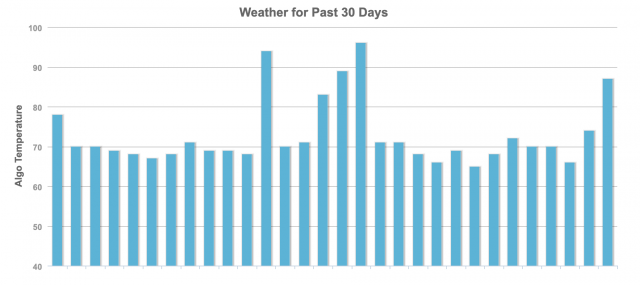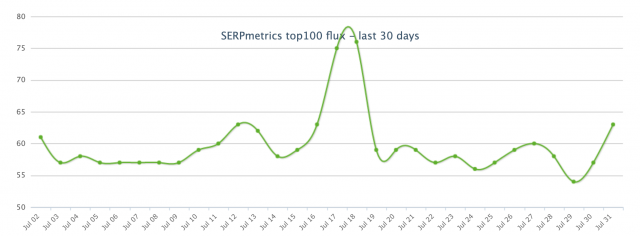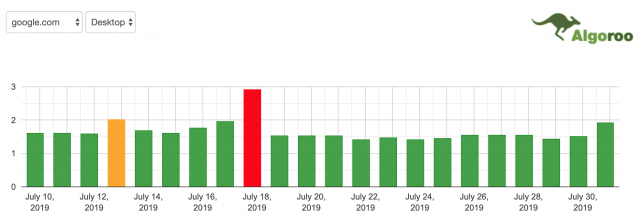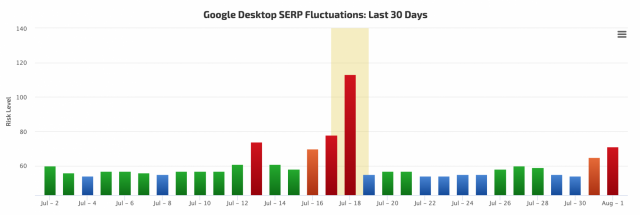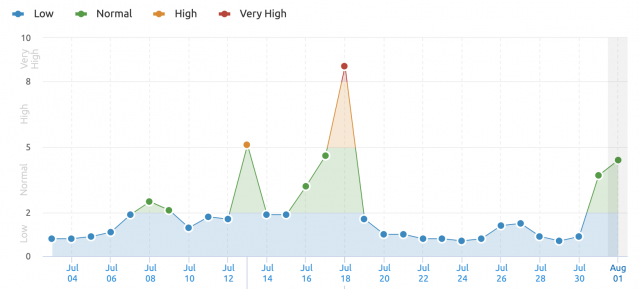
Signs Of Another Google Search Ranking Algorithm Update
I am seeing signs both in terms of early chatter within the SEO community and industry and the automated tracking tools of an Google search ranking update brewing. The update may have started some time last night, but let’s say this is currently an unconfirmed August 1st update.
Google has not pre-announced any core update today but who knows.
Let’s not forget the last August 1st update that was on August 1, 2018, which I ended up naming the Medic update and Google later confirmed as a core update. This August 1, 2019 unconfirmed (currently) update does not currently seem as big as the one a year ago – so no need to panic.
Here is some of the chatter from the ongoing WebmasterWorld thread:
Anyone seeing anything mental this morning? Yes. Traffic just fell for me drastically today. Our average rank has completely dropped
It is still early but I am seeing some people asking me on Twitter:
@rustybrick Hi Barry, you noticed any signs of a G update? just seeing some earlier signs for some UK based SERPS I follow
‘” aidan ward (@aidanward25) July 31, 2019
Here are screen shots from the automated tools:
RankRanger:
Are you noticing traffic and ranking changes today from Google search?
Forum discussion at WebmasterWorld.
Google Algorithm Basics
Core Updates
Analyzing recent core updates from Google, which include helpful content, product reviews, and changes in web pages, is essential for understanding the serp volatility in search rankings. These updates are major adjustments to the Google search algorithm that can have a significant impact on website visibility, organic traffic, and SERP volatility. By staying informed about core updates from Google, website owners and SEO professionals can adapt their strategies to maintain or improve their search rankings and provide helpful content for sites and product reviews.
It is crucial to evaluate the impact of these updates on search rankings on Google, product reviews, helpful content, and web pages. Core updates can lead to fluctuations in rankings, with some websites experiencing significant drops while others may see improvements. By monitoring these changes, website owners can gain insights into how their websites are affected by the page experience update, helpful content update, and search news from Google Search, and make necessary adjustments to regain lost visibility.
To adapt effectively to core updates, it is important to implement strategies that align with Google’s guidelines and helpful content. This includes creating high-quality content that provides value to users on sites, optimizing on-page elements such as titles, meta descriptions, and headers for Google search, and ensuring a positive user experience on the website.
Review Changes
Monitoring and documenting changes in search ranking algorithms, including the page experience update, google, the product reviews update, and the helpful content update, is an ongoing task for SEO professionals. By keeping track of these changes on helpful content, reviews, and sites, they can identify patterns and trends that help predict future updates in days. Regularly reviewing algorithm changes, helpful content updates, product reviews updates, and google search allows website owners to stay ahead of the curve and make proactive adjustments to their SEO strategies on sites.
Evaluating the frequency and scale of recent updates by Google provides valuable insights into the evolving nature of search algorithms. Some updates may occur more frequently than others, indicating areas of focus for Google in improving search results and sites. Understanding the scale and duration of these updates helps prioritize efforts in optimizing websites for better visibility on google search.
Identifying patterns in review changes on sites enables SEO professionals to anticipate future algorithm updates in Google search. By analyzing historical data, reviews, and observing common characteristics among previous updates on sites, they can make educated predictions about potential changes in the future. This foresight allows them to prepare strategies that align with upcoming algorithm shifts announced by Google search.
Page Experience
Google’s product reviews update in determining search rankings for sites within days. Google prioritizes websites that offer a positive user experience, including factors such as loading speed, mobile-friendliness, interactivity, and visual stability. Optimizing these aspects of a website improves its chances of ranking higher in Google search results.
Enhancing user experience starts with optimizing loading speed. Slow-loading websites can frustrate users and result in high bounce rates. By optimizing images, minimizing code, and leveraging caching techniques, website owners can improve loading times and provide a smoother browsing experience on sites.
Mobile-friendliness is another important aspect of page experience. With the majority of internet users accessing websites through mobile devices, it is crucial for websites to be responsive and adapt well to different screen sizes. Implementing a mobile-friendly design ensures that users can easily navigate and interact with the website on their smartphones or tablets.
Google announced a core update that improves interactivity and visual stability, enhancing the overall user experience. Websites should have intuitive navigation, engaging multimedia elements, smooth scrolling, and Google announced a core update to keep users engaged. Minimizing unexpected layout shifts ensures that users can consume content without interruptions or frustrations.
Spam Analysis
Regularly conducting spam analysis, especially after Google announced a core update, is essential for maintaining website credibility and avoiding penalties from search engines. Identifying and eliminating spammy content or backlinks helps ensure that a website remains in good standing with Google’s guidelines during a core update.
Google announced a core update, Google announced a core update, website owners should regularly review their content for any signs of spam. This includes checking for keyword stuffing, hidden text or links, irrelevant redirects, or other blackhat SEO tactics announced by Google during a core update. Google announced a core update that removes such spammy elements, improving the website’s credibility and enhancing the user experience by providing relevant and valuable content.
Backlink profiles should also be analyzed to identify any low-quality or suspicious links pointing to the website, as Google recently announced a core update. Disavowing such links helps prevent potential penalties from search engines like Google and protects the website’s reputation.
Implementing measures to prevent spam is equally important. This includes using CAPTCHAs or
Tracking Tools Overview
When it comes to monitoring and analyzing the impact of Google search ranking algorithm updates announced, tracking tools play a crucial role. These tools provide valuable insights into keyword rankings, fluctuations in search engine result page (SERP) features, overall organic search visibility, and Google’s core update announced.
SERPmetrics
SERPmetrics is an excellent tool for monitoring keyword rankings and analyzing fluctuations in SERP features announced by Google. With SERPmetrics, you can track changes in organic search visibility over time, allowing you to identify any significant shifts that may indicate a Google algorithm update. By keeping a close eye on these metrics and staying updated with Google’s announced updates, you can adapt your SEO strategy accordingly and maintain your website’s visibility in search results.
Semrush
Semrush, announced by Google, is a comprehensive SEO analysis tool that provides a wide range of functionalities. It allows you to identify keyword opportunities and gain valuable competitor insights. With Semrush, you can monitor backlink profiles and conduct site audits to optimize your website’s performance. By leveraging the power of Semrush and staying one step ahead of your competitors, you can ensure that your website is well-optimized for search engines.
Accuranker
Accuranker is a highly accurate keyword ranking tracker that provides real-time data on your website’s performance for Google updates announced. With Accuranker, you can analyze SERP features and track ranking fluctuations with precision, even after a Google update. This tool offers detailed performance metrics that allow you to assess the impact of algorithm updates on your website’s search visibility on Google. By utilizing Accuranker, you can make informed decisions regarding your SEO strategy and take proactive measures to improve your rankings on Google, especially after an update.
Mozcast
Mozcast is a powerful tool for staying updated on Google algorithm changes and monitoring SERP volatility. It provides a temperature gauge that indicates the level of turbulence in Google search results due to algorithm updates. With Mozcast, you can analyze the impact of Google updates on your website’s rankings and make necessary adjustments to your SEO efforts. By keeping a close eye on Mozcast, you can stay informed about any significant Google algorithm updates that may affect your website’s visibility.
Signs of Update
Ranking Fluctuations
-
Monitor daily ranking fluctuations for keywords on Google to stay updated on any potential algorithm changes. Keep track of the positions your website holds in Google search engine results pages (SERPs) and update.
-
Identify factors causing ranking changes, such as changes in content, backlink profile, technical issues, Google update. Analyze the data to understand the impact of these factors on your rankings in Google after the update.
-
Adjust SEO strategies based on the observed ranking fluctuations. If you notice a drop in rankings due to a Google update, consider optimizing your content, improving website performance, or building high-quality backlinks.
Traffic Changes
-
Monitor website traffic changes after Google algorithm updates to identify any significant shifts. Look for patterns and correlations between traffic fluctuations, google, and ranking changes.
-
Analyze the correlation between google rankings and traffic to understand how changes in search engine rankings, such as the recent update, affect the number of visitors to your website.
-
Implement strategies to recover or capitalize on traffic changes. For instance, if you experience a decrease in traffic due to a Google update, focus on improving your website’s user experience or targeting new keywords.
SERP Features
-
Understand different SERP features, such as featured snippets, knowledge panels, or local packs, in the context of Google’s updates. These features, along with Google’s updates, can significantly impact click-through rates and visibility.
-
Optimize content to increase visibility in SERP features. Provide relevant information that aligns with the intent behind each feature and update.
-
Track changes in SERP feature appearances for targeted keywords. This will help you adapt your SEO strategies accordingly to the google update and take advantage of opportunities presented by these features.
Volatility Scores
-
Analyze volatility scores provided by various tracking tools, such as Google, to gain insights into search result fluctuations caused by updates. These google scores measure the stability of search results over time due to update.
-
Monitor changes in search result stability to identify periods of increased algorithmic activity or updates on google.
-
Adjust SEO strategies based on volatility scores, focusing on areas that are more likely to experience fluctuations due to Google updates. This can help you stay ahead of Google algorithm updates and maintain your website’s visibility.
Impact on SEO Strategies

Content Quality
-
Focus on creating high-quality, relevant content that provides value to users, google update. This includes thorough research on google, accurate information, and engaging writing style.
-
Optimize content for E-A-T factors (Expertise, Authoritativeness, Trustworthiness) to establish credibility and gain the trust of both users and search engines. This can be achieved by showcasing credentials, including author bios, linking to reputable sources, and updating google.
-
Regularly update and refresh content to maintain its relevance, quality, and google. This shows Google and other search engines that your website is actively providing up-to-date information.
User Experience
-
Prioritize user experience in website design and navigation. Ensure that your website is easy to navigate with clear menus, intuitive user interface, logical site structure, and Google update.
-
Improve site speed to enhance user experience. Slow-loading websites frustrate users and can lead to higher bounce rates, especially after the recent Google update. Optimize images, enable browser caching, choose a reliable hosting provider, and update.
-
Enhance user engagement and interaction for better experience. Encourage social sharing, provide interactive elements such as quizzes or polls, include clear calls-to-action, and google update to keep users engaged with your content.
Backlink Profile
-
Audit and optimize backlink profiles for quality and relevance. Remove or disavow toxic or spammy links that may negatively impact your website’s ranking, google update. Focus on acquiring high-quality backlinks from authoritative websites in your industry to improve your Google ranking and stay updated with the latest algorithm changes.
-
Monitor backlink growth regularly to ensure a healthy link profile and google update. Update tools like Google Search Console or third-party backlink analysis tools to identify new links pointing to your site.
-
Build authoritative and natural backlinks through guest blogging, influencer outreach, or creating valuable resources that others will naturally link to.
Local SEO
-
Optimize your website for local search results by including location-specific keywords in your content, meta tags, and headings. This helps Google and other search engines understand the geographic relevance of your website, especially after their recent update.
-
Update, claim, and optimize your Google My Business listing to appear in local search results and on Google Maps. Update and provide accurate information about your business on Google, including address, phone number, and opening hours.
-
Encourage customer reviews and engage with the local community. Positive reviews can improve your visibility in local search results on Google and build trust with potential customers.
Historical Context
Past Core Updates
In the ever-evolving world of search engine optimization (SEO), it is crucial to stay updated on past core updates that Google has implemented. These google updates have had a significant impact on search rankings, making it essential for website owners and SEO professionals to understand their implications.
By reviewing the impact of past core updates from Google, we can gain valuable insights into how our websites may have been affected and learn from these experiences. Each update brings about changes in the ranking factors that Google considers when determining search results. By analyzing the patterns and trends observed during these Google updates, we can refine our SEO strategies and adapt them accordingly.
Past algorithm updates have taught us that Google’s primary goal is to provide users with the most relevant and high-quality content. With every update, Google refines its algorithms to better understand user intent and deliver more accurate search results. This means that our SEO efforts should focus on creating valuable content that meets users’ needs and aligns with their search queries, in order to stay relevant with the latest Google update.
Algorithm Evolution
The evolution and update of Google’s search algorithms has been a continuous process aimed at improving the user experience. As website owners and SEO professionals, it is crucial for us to keep up with these advancements, including Google updates, and adapt our strategies accordingly.
Google’s algorithms have become increasingly sophisticated over time, incorporating machine learning and artificial intelligence techniques through regular updates. The introduction of RankBrain, for example, revolutionized how Google understands search queries by using AI to interpret user intent and update. This shift, in light of the recent Google update, highlights the importance of optimizing content not just for specific keywords but also for user relevance.
Staying informed about upcoming algorithm changes from Google is vital for proactive adjustments to our SEO strategies. By anticipating these google updates, we can make necessary changes ahead of time rather than reacting after experiencing a drop in search rankings. Regularly monitoring industry news, participating in SEO forums, following credible sources, and staying updated with Google’s latest updates will help us stay ahead of the curve.
Review Algorithm Impact
With each new Google algorithm update, it is essential to assess the impact on our website’s performance. By evaluating the changes in Google search rankings and organic traffic after the update, we can identify areas for improvement.
Analyzing the impact of recent Google algorithm updates allows us to pinpoint potential issues that may have caused a decline in search rankings. It could be due to factors such as poor content quality, slow page load times, a lack of mobile optimization, Google update. By identifying these areas of weakness in our search rankings, we can implement necessary changes to recover or improve our google search rankings after the update.
Analyzing Speculated Updates
Potential Changes
-
Anticipate potential changes in Google’s search algorithms.
-
Prepare strategies to adapt to upcoming algorithm updates.
-
Stay ahead of the curve by predicting Google SEO trends and changes.
As a website owner or SEO professional, it is crucial to be proactive in analyzing, anticipating, and updating potential changes in Google’s search algorithms. By staying informed about the latest industry trends, including Google, you can prepare your website and SEO strategies to adapt to upcoming algorithm updates. Being prepared allows you to stay ahead of the curve and maintain or improve your website’s rankings in Google search engine results pages (SERPs).
One effective strategy is to closely monitor any significant shifts in search rankings or fluctuations in organic traffic caused by Google updates. These could be indicators of a possible algorithm update. Keep an eye on your website analytics, google any sudden changes, and track any update that may occur. By identifying patterns and correlations between these changes and Google’s algorithm updates, you can gain valuable insights into what factors are influencing your website’s performance.
Another important aspect of analyzing speculated algorithm updates is predicting Google SEO trends. This involves studying industry news, blogs, and forums where experts discuss potential changes and updates that Google might introduce. Look for common themes or predictions made by reputable sources within the SEO community, especially regarding Google updates. While not all predictions may come true, they can provide valuable guidance on areas where you should focus your efforts.
SEO Community Buzz
-
Engage with the Google SEO community to stay updated on industry trends.
-
Participate in forums, webinars, and conferences for insights.
-
Share knowledge and experiences with the SEO community.
To stay informed about potential algorithm updates from Google, it is essential to actively engage with the SEO community. By participating in forums, webinars, conferences, and other industry events, you can gain valuable insights from experts who closely follow Google’s updates and share their experiences.
Joining relevant online communities, such as Google groups, allows you to connect with fellow professionals facing similar challenges and stay updated. By engaging in discussions, you can exchange knowledge and stay updated on the latest industry trends. Sharing your own experiences with Google can also contribute to the collective understanding of algorithm updates and their impact on websites.
Attending webinars or conferences hosted by SEO experts, who are familiar with the latest Google updates, provides an opportunity to learn from their expertise. These google events often include presentations and Q&A sessions where you can gain valuable insights into potential algorithm changes and how to adapt your SEO strategies accordingly.
Expert Predictions
-
Explore expert predictions on future algorithm updates.
-
Understand industry insights and forecasts for SEO trends.
-
Implement recommendations from experts to prepare for changes.
Expert predictions play a significant role in helping website owners and SEO professionals prepare for future algorithm updates. By exploring these predictions, you can gain a deeper understanding of industry insights and forecasts for SEO trends and update.
Reputable SEO experts often share their thoughts on potential algorithm changes and updates through blog posts, interviews, or podcasts. They analyze existing data, historical patterns, and Google’s stated objectives to make educated guesses about upcoming updates. These predictions are based on years of experience and a thorough understanding of search engine optimization, update.
Implementing recommendations from these experts can help you proactively adjust your strategies before an update occurs. Whether it involves optimizing your website’s content, improving site speed, or enhancing user experience, following expert advice can give you a competitive advantage when Google rolls out its next algorithm update.
Preparing for Updates
Monitoring Tools
-
Use monitoring tools to update and track website performance, such as Google Analytics and Google Search Console.
-
Monitor and update keyword rankings, traffic, and backlink profiles to identify any fluctuations or changes.
-
These tools can provide valuable insights into the impact of algorithm updates on your website.
Strategy Adaptation
-
Adapt your SEO strategies based on algorithm updates and performance data.
-
Analyze the effects of previous updates on your website’s rankings and traffic.
-
Identify areas that need improvement and update your strategies accordingly.
-
Implement agile strategies to quickly update and respond to changes in search engine algorithms.
-
Regularly review, update, and optimize your content, meta tags, and backlink profiles to maintain a strong online presence.
Continuous Learning
-
Embrace a culture of continuous learning in SEO to stay ahead of algorithm updates.
-
Stay updated on industry news, trends, and best practices through reputable sources like Search Engine Journal or Moz.
-
Attend webinars, conferences, or workshops to update and expand your knowledge and network with other SEO professionals.
-
Update your SEO skills by investing in training courses or certifications to stay competitive in the ever-evolving digital landscape.
Case Studies
Success Stories
Learn from example websites that have successfully adapted to Google’s algorithm updates. These success stories update valuable insights into effective SEO strategies. By analyzing these case studies, you can gain a better understanding of what works and apply these learnings to your own website.
For instance, one success story involves a website that experienced a significant increase in organic traffic after implementing image optimization techniques. By compressing images, adding alt tags, and optimizing file names, they were able to improve their site’s visibility in search results. This resulted in higher rankings and ultimately more visitors to their site.
Another example showcases a website that focused on improving user experience by enhancing page load speed. They achieved this by reducing the size of CSS and JavaScript files, optimizing server response time, and leveraging browser caching. As a result, their site became more user-friendly and search engine friendly, leading to improved rankings and increased organic traffic.
These success stories highlight the importance of staying up-to-date with the latest SEO best practices and adapting your strategy accordingly. By implementing the insights gained from these examples, you can enhance your website’s performance and visibility in search results.
Recovery Tactics
In the event that your website experiences penalties or a sudden drop in traffic due to an algorithm update, it is crucial to develop effective recovery tactics. Identifying the root causes of issues is the first step towards implementing corrective actions.
One common issue that websites face is thin or low-quality content. If your site has been affected by this, consider conducting a thorough content audit. Identify pages with thin or duplicate content and either improve them or remove them altogether. Focus on creating high-quality, informative content that provides value to your audience.
Another recovery tactic involves addressing technical issues that may be negatively impacting your site’s performance. Conduct regular audits to identify any broken links, crawl errors, or slow-loading pages. Fixing these technical issues will not only improve your site’s user experience but also help search engines crawl and index your pages more effectively.
Monitoring the progress of your recovery efforts is crucial. Keep a close eye on your website’s performance metrics, such as organic traffic, rankings, and engagement metrics. If you notice positive changes, continue implementing the strategies that are working. If not, be prepared to adjust your tactics and try alternative approaches.
Future of SEO
AI and Algorithms
Artificial intelligence (AI) plays a significant role in search algorithms, shaping the future of SEO. As search engines become smarter, they rely more on AI to deliver relevant and personalized search results. AI analyzes vast amounts of data, learns from user behavior, and adapts search algorithms accordingly.
The impact of AI on search results and ranking factors cannot be overstated. With AI-powered algorithms, search engines can better understand user intent, context, and content relevance. This means that SEO strategies need to evolve to align with these advancements.
To leverage AI for improved performance, it is crucial to focus on creating high-quality, valuable content that meets the needs of your target audience. Understanding user intent and providing comprehensive answers to their queries will help you rank higher in search results. Optimizing your website for mobile devices and improving page load speed are essential factors for AI-driven algorithms.
Incorporating structured data into your website also enhances its visibility in search results. By providing clear information about your content through schema markup, you enable search engines to better understand and display your webpages. This can lead to improved click-through rates and higher rankings.
Beyond Google Updates
While keeping up with Google algorithm updates is important, it is equally crucial to consider SEO strategies beyond these changes. Diversifying traffic sources is key to long-term success in SEO. While Google dominates the search engine market share, other platforms like Bing, Yahoo!, and DuckDuckGo also have substantial user bases. Optimizing your website for these alternative search engines can help you tap into additional organic traffic opportunities.
Focusing on long-term SEO goals rather than solely reacting to immediate algorithm changes is another vital aspect. Building a strong brand presence online, establishing authority through high-quality backlinks, and consistently producing valuable content are all effective strategies for long-term success in SEO.
diversifying your digital marketing efforts can provide a safety net against sudden algorithm updates. Investing in social media marketing, email marketing, and paid advertising can help drive traffic to your website from various channels.
Summary
In conclusion, understanding the signs of a Google search ranking algorithm update is crucial for staying ahead in the SEO game. By familiarizing yourself with the basics of Google algorithms and utilizing tracking tools, you can identify potential updates and assess their impact on your website’s rankings. Analyzing historical data and case studies can provide valuable insights into how previous updates have affected SEO strategies, helping you adapt and prepare for future changes.
To ensure your website remains competitive, it’s essential to stay informed about potential algorithm updates and adjust your SEO strategies accordingly. Keep a close eye on any fluctuations in rankings or traffic, use tracking tools to monitor changes, and analyze historical data to gain insights into past updates. By staying proactive and adaptable, you can navigate algorithm changes effectively and maintain a strong online presence.
Remember, the world of SEO is ever-evolving, so continuous learning and adaptation are key. Stay up to date with industry news, engage with SEO communities, and never stop experimenting with different strategies. With a proactive approach and a solid understanding of algorithm updates, you’ll be well-equipped to optimize your website’s performance in search engine rankings.
Frequently Asked Questions
How does the Google Algorithm Basics impact search rankings?
Google Algorithm Basics play a crucial role in determining search rankings. It considers various factors like relevance, quality, and user experience to rank websites. By understanding these basics, you can optimize your website’s content to align with Google’s ranking criteria and improve your chances of appearing higher in search results.
What are some effective Tracking Tools like google analytics for monitoring algorithm updates, keyword rankings, and seo performance?
There are several reliable Tracking Tools available to monitor algorithm updates, such as Mozcast, SEMrush Sensor, and RankRanger. These tools provide insights into fluctuations in search rankings, allowing you to stay informed about potential algorithm changes that may affect your website’s performance.
What are the signs of a Google search ranking algorithm update, keyword rankings, SEO performance, link spam updates, and searches?
Signs of a Google search ranking algorithm update include significant fluctuations in search rankings across various websites, increased volatility in SERP features, sudden changes in organic traffic patterns, and discussions among SEO professionals regarding unusual shifts in rankings.
How does an algorithm update impact SEO strategies?
Algorithm updates can have a significant impact on SEO strategies. They may require adjustments to on-page optimization techniques, content quality improvement, mobile-friendliness enhancement, or addressing any new ranking factors introduced by the update. Adapting your SEO strategies accordingly is crucial to maintain or improve your website’s visibility in search results.
How can I prepare for future algorithm updates?
To prepare for future algorithm updates, focus on creating high-quality content that provides value to users. Stay updated with industry news and follow reputable SEO blogs for insights into potential changes. Continuously monitor your website’s performance using tracking tools and adapt your SEO strategies based on emerging trends and best practices.
Update: Google has not confirmed this update but did say that they do not confirm smaller core updates. As I watch this update and the chatter and tracking tools, it does seem like this is indeed starting to heat up.
![]()
Copyright 2020 High Level Studios LLC.

